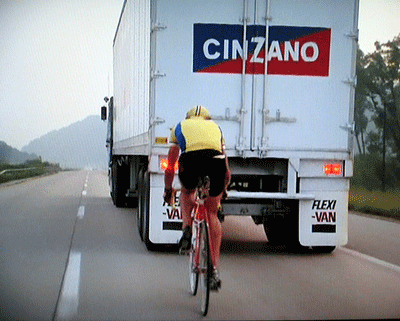Some of you may have seen the video recently of a rider pacing close behind a lorry at well over 30mph on the Newtownards Road, and the flurry of social media comments it generated. This got me thinking about safety, and how we should respond to something like this.
 In the film Roxanne, Steve Martin’s character replies to a clumsy insult about his nose with a variety of smarter and wittier options. So in a similar style, here are some possible responses to the video –
In the film Roxanne, Steve Martin’s character replies to a clumsy insult about his nose with a variety of smarter and wittier options. So in a similar style, here are some possible responses to the video –
- Admiration – That rider is fit and skilful.
- Indignation – He’s taking a big risk, both with his own safety and with the safety of those around him.
- Mindful – that rider is 100% in the zone, completely focused on his pedalling and the gap between him and the lorry. Truly in the flow..
- Pyschological – I hope the lorry driver wasn’t traumatised by having another vehicle so close behind him.
- Legal – if cyclists aren’t allowed to sit two feet behind another vehicle, what does that mean for group rides like club runs and road races?
- Irrational – Cyclists are slow. They shouldn’t be allowed to pass cars.
- Indignation (2) – The lorry was clearly exceeding the speed limit here. Why is no-one outraged about that?
- Liberal – Why do we have to point fingers and post videos? Live and let live.
- and so on…
Like many conflicts between cyclists and motorists, it is difficult to know what the right response is. Cyclists, like motorists, have differing levels of skill and differing attitudes to risk.
However, one thing is clear – if motorists or cyclists get angry, then their judgement can become clouded, and any situation is likely to become more dangerous.
So a good general rule is to try and avoid doing things on your bike that will unnecessarily antagonise other road users. Things like jumping red lights, cutting up cars, holding up traffic for long periods by riding two a breast, and so on.. And to this list we should probably add high speed pacing behind other vehicles in heavy traffic…
As the current DOE safety campaign says, “let’s share the road to zero“.
One final thought. Cyclists often (justifiably) feel that they are victims of inconsiderate or careless driving. And while anger and aggression may be the natural response, it is rarely effective. Instead, making an effort to maintain the high moral ground, to set a good example, and to educate, are far better.
Check out Gandhi’s response to the biblical challenge to “turn the other cheek” when you’ve been wronged. It may not be easy (and I know I often fail), but we should at least try. For all our sakes. Save riding.
